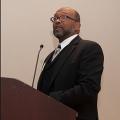I arrived at Morehouse College in Atlanta in 1971 completely unprepared for the world I found. Raised in a middle class black northern family, I had read about the civil rights movement, but my classmates had lived it. I met students who lived segregation — they had seen their parents turned away from voting booths. I met a student who had decided not to go to Sunday school at 16th Street Baptist Church in Birmingham the day it was bombed, and his classmates were killed. I met students who had lived with governors, mayors, and police chiefs who sanctioned brutality against protestors in the name of public safety.
It was one thing to read about it — another to encounter the stories and scars, the narratives and names.
So when I returned for my sophomore year, armed with a year of conscious change and — even more important to my 18-year-old mind, a car — it was a no-brainer that in my first opportunity to vote, I would volunteer to drive people to the polls. Assigned to a poor public housing development, I ferried seniors back and forth to their polling places, amazed at the quiet dignity and determination they displayed in pressing their way to the polls. Not too proud to ask for help, they had sought rides to the polls through various community organizations who had said, “If you want to vote, we’ll get you there.”
So I volunteered to take them, almost as excited about the opportunity to listen to their stories as I was about my first opportunity to vote. They talked about blacks being excluded from the franchise in their rural hometowns; they looked with hope to electing Atlanta’s first black mayor, Maynard Jackson. This was soon after the 1971 departure of Georgia Governor Lester Maddox, an ardent segregationist best known for chasing potential black patrons from his Atlanta restaurant with an axe handle. They acknowledged that their votes for Democratic presidential candidate George McGovern would not be enough to stop the Richard Nixon political juggernaut. But they pressed anyway.
I think of them every time I read about another effort at voter suppression and voting restrictions. When I look at the ways in which states from Pennsylvania to North Carolina have tried to pass legislation peeling back the gains of the Voting Rights Act — to maintain control over the seemingly diminishing resources of what is still the most powerful nation on earth — I think of the seniors from that public housing development squeezing into the back and the bucket seats of my 1968 Mustang, and the hope they had for America as they cast their ballots.
“Those are the people politicians are afraid of,” I think to myself. “Politicians are literally afraid of the ballot in the hands of those on the margins who have a privileged view of our society’s dysfunction, precisely because they benefit the least from them.”
In his book The Prophetic Imagination, Hebrew Bible scholar Walter Brueggemann speaks of the “royal consciousness” of the Hebrew elite who depend on the “numbness” of the masses to remain in power. The royal consciousness represents the privileged status of those in power, and their usurpation of the right to view God and the world as it is, and replace it with a world where all roads lead to their self-interest. Numbness refers to the lack of power of the poor, common folks, and their acceptance of their plight and oppression. The role of the prophet, says Brueggemann, is to awaken the “numbed” to awareness, and join them in imagining alternatives. The people in Atlanta had been awakened in the prophetic age of the civil rights movement, and seized their voices. I remember their sound as we drove to the polls.
So the elite — the “royals” — in political garb fear them. They fear their resistance to the psychological anesthesia that breeds social numbness. They plot from the vantage of royal entitlement, bolstered by the numbed members of their own tribe who mistake ethnicity for entitlement and color for community, and work to silence today’s heirs to those Atlanta seniors. The royals fail, however, to note that their sense of entitlement does not escape the view of the God of the prophets who continues to stimulate the imagination of the formerly numbed. The royals do not understand that theirs is not “the kingdom, the power and the glory.” They do not understand that God will not endorse their chicanery and machinations.
They do not understand that Babylon awaits the continued infidelity of elites who continue to silence the poor.
Got something to say about what you're reading? We value your feedback!

